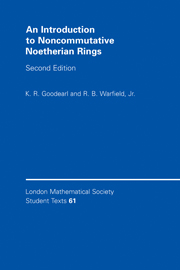Book contents
- Frontmatter
- Contents
- Introduction to the Second Edition
- Introduction to the First Edition
- Prologue
- 1 A Few Noetherian Rings
- 2 Skew Polynomial Rings
- 3 Prime Ideals
- 4 Semisimple Modules, Artinian Modules, and Torsionfree Modules
- 5 Injective Hulls
- 6 Semisimple Rings of Fractions
- 7 Modules over Semiprime Goldie Rings
- 8 Bimodules and Affiliated Prime Ideals
- 9 Fully Bounded Rings
- 10 Rings and Modules of Fractions
- 11 Artinian Quotient Rings
- 12 Links Between Prime Ideals
- 13 The Artin-Rees Property
- 14 Rings Satisfying the Second Layer Condition
- 15 Krull Dimension
- 16 Numbers of Generators of Modules
- 17 Transcendental Division Algebras
- Appendix. Some Test Problems for Noetherian Rings
- Bibliography
- Index
Prologue
Published online by Cambridge University Press: 11 November 2010
- Frontmatter
- Contents
- Introduction to the Second Edition
- Introduction to the First Edition
- Prologue
- 1 A Few Noetherian Rings
- 2 Skew Polynomial Rings
- 3 Prime Ideals
- 4 Semisimple Modules, Artinian Modules, and Torsionfree Modules
- 5 Injective Hulls
- 6 Semisimple Rings of Fractions
- 7 Modules over Semiprime Goldie Rings
- 8 Bimodules and Affiliated Prime Ideals
- 9 Fully Bounded Rings
- 10 Rings and Modules of Fractions
- 11 Artinian Quotient Rings
- 12 Links Between Prime Ideals
- 13 The Artin-Rees Property
- 14 Rings Satisfying the Second Layer Condition
- 15 Krull Dimension
- 16 Numbers of Generators of Modules
- 17 Transcendental Division Algebras
- Appendix. Some Test Problems for Noetherian Rings
- Bibliography
- Index
Summary
Since much of the current interest in noncommutative noetherian rings stems from applications of the general theory to several specific types, we present here a very sketchy introduction to some major areas of application: polynomial identity rings, group algebras, rings of differential operators, enveloping algebras, and quantum groups. Each of these areas has a very extensive theory of its own, far too voluminous to be incorporated into a book of this size. (See for instance Rowen [1980], Passman [1985], McConnell-Robson [2001], and Brown-Goodearl [2002]). Instead, we shall concentrate on surrogates – some classes of rings that are either simple prototypes or analogs of the major types just mentioned – which we can investigate by relatively direct methods while still exhibiting the flavor of the areas they represent. These surrogates are module-finite algebras over commutative rings (for polynomial identity rings), skew-Laurent rings (for group algebras), formal differential operator rings (for rings of differential operators and some enveloping algebras), and general skew polynomial rings (for some enveloping algebras and quantum groups). They will be introduced below and studied in greater detail in the following two chapters.
We will conclude the Prologue with a few comments about our notation and terminology.
• POLYNOMIAL IDENTITY RINGS •
Commutativity in a ring may be phrased in terms of a relation that holds identically, namely xy − yx = 0 for all choices of x and y from the ring.
Information
- Type
- Chapter
- Information
- An Introduction to Noncommutative Noetherian Rings , pp. xiv - xxivPublisher: Cambridge University PressPrint publication year: 2004
